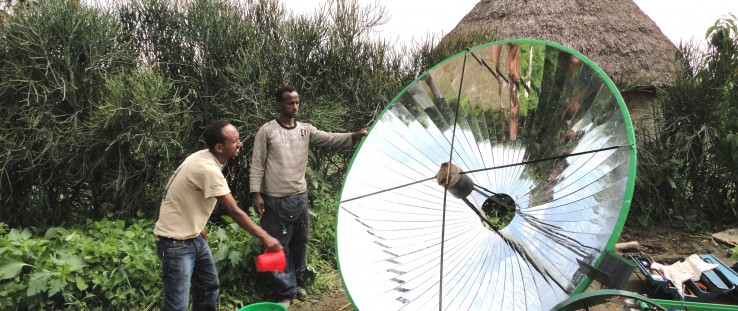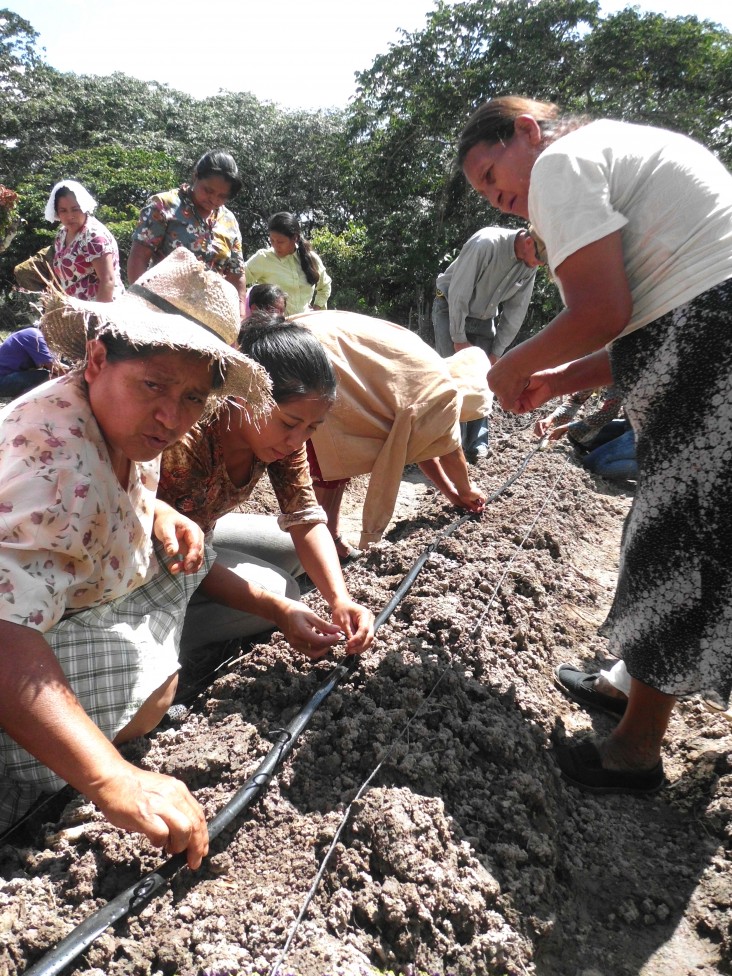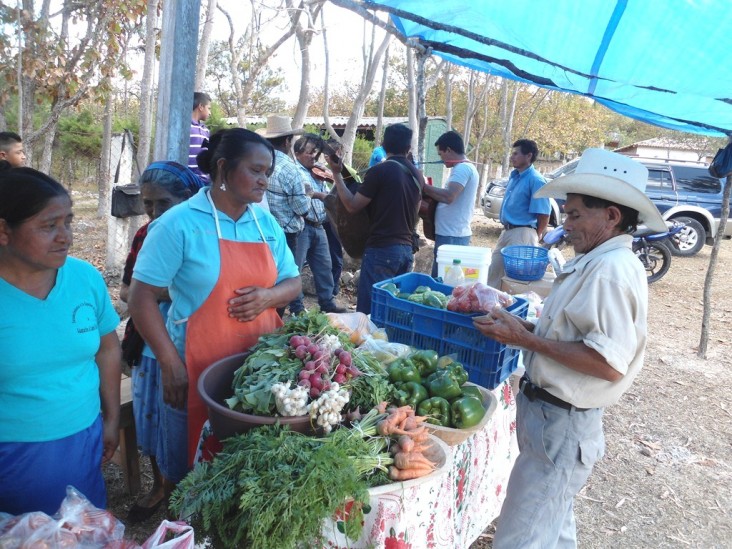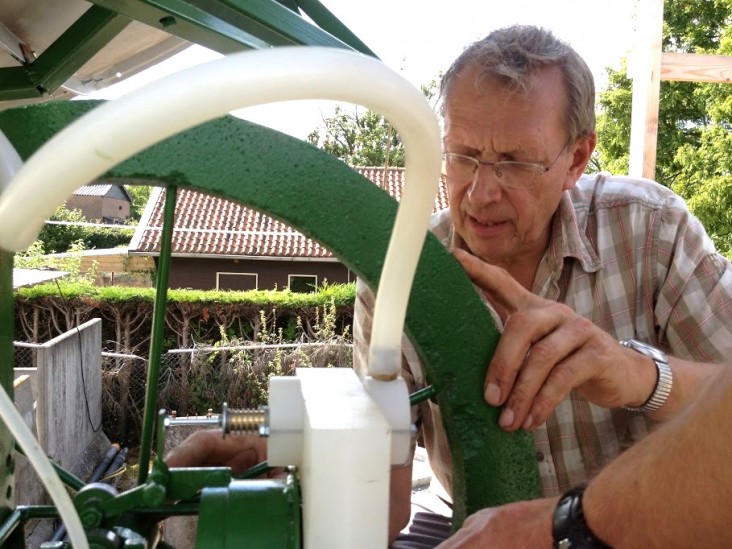 A prototype of International Development Enterprises’ Clean Irrigation System in Ethiopia
Photo courtesy of iDE
A prototype of International Development Enterprises’ Clean Irrigation System in Ethiopia
Photo courtesy of iDE
 A prototype of International Development Enterprises’ Clean Irrigation System in Ethiopia
Photo courtesy of iDE
A prototype of International Development Enterprises’ Clean Irrigation System in Ethiopia
Photo courtesy of iDE
Like most indigenous farmers in the western highlands of Honduras, Herminia Gutierrez’s family has cultivated coffee on a 2.5-acre plot for generations. Each day during the growing season, she, her husband and their eight children would make several trips to a river about 40 minutes away and carry back five buckets of water to replenish their plants.
As with most subsistence growers in the Marcala region, they staked their lives on this one crop. As a cooperative member, she was insulated from a common practice here: having to turn over nearly all the proceeds from her harvests to loan sharks, or “coyotes.”
Several years ago, a field technician from a Colorado-based nonprofit, International Development Enterprises (iDE), introduced Gutierrez to a more water-efficient drip irrigation system. Since then, 300 farmers in Marcala have adopted it.
“It helped a lot,” the 50-year-old matriarch said. “I have more coffee plants and they are healthier.”
iDE encouraged Gutierrez and the other farmers to use the extra water to cultivate vegetables as a way to boost their nutrition and put more cash in their pockets. In addition to coffee, she and other women in the village of La Estanzuela are now growing organic lettuce, beets, cabbage, Mayan herbs and other vegetables.
“Children here are also growing better. There are fewer cases of diarrhea,” she said, adding her cooperative is now selling extra produce to markets 28 miles away.
The irrigation system iDE introduced in Honduras uses simple foot-powered treadle pumps to draw water for irrigation from wells. It is a critical improvement over hauling water in buckets, but in today’s age of innovation, this upgrade is about to come up against an even newer innovation.
In December, iDE was awarded a $1.5 million grant from the Powering Agriculture: An Energy Grand Challenge for Development, led by USAID with Germany, Sweden and U.S. power company Duke Energy. iDE beat out nearly 500 competitors with its plan to design and distribute a solar-powered piston pump to replace its foot-powered treadle pump. iDE will link the new solar pump to existing irrigation systems in Honduras, Nepal and Zambia.
Globally, more than 800 million small-scale farmers lift and haul water by hand to irrigate crops on small parcels of 5 acres or less. In the past decade, millions of these farmers have switched to using diesel pumps for irrigation.
iDE is betting its new solar-powered Clean Irrigation Solution can compete or even beat diesel-powered irrigation for small farmers in terms of both cost and productivity benefits—and without introducing a whole new set of health and sustainability risks that come with having to purchase and burn diesel.
According to Bob Nanes, iDE’s vice president of technology and innovation, diesel pumps cost about $250 apiece, plus about $150 a year for maintenance and diesel fuel. iDE’s system will cost more than a diesel pump upfront—about $400, depending on the model. But with the savings on fuel and maintenance, iDE expects most farmers will break even the first year. It predicts its solar system will beat out all fossil fuel pump systems after two years.
“The solar pump is the best of all possible worlds,” said Nanes. “The farmer doesn’t have to carry water or buy fuel. There is also much less maintenance than diesel and you don’t have those recurring costs.” He added it simply turns itself on when the sun rises, so it’s easy to use.
The system can be run manually on cloudy days, if necessary. While it would likely be connected to run off a single solar power source—including photovoltaic panels if they are affordable—it will also be able to run off an alternating current in places where there is an electricity grid.
Kit Batten, USAID’s global climate change coordinator and a key sponsor of Powering Agriculture, said iDE’s clean irrigation system is a Grand Challenge for Development winner precisely because it will increase household prosperity and food security and also help deliver clean, reliable energy to developing countries at a time when climate change poses growing risks to agriculture.
Using solar-powered irrigation pumps instead of diesel on small farms would cut carbon dioxide emissions by a small amount, said Nanes, especially if adopted on a wide scale. But the real benefit lies in helping move small farmers to affordable, renewable technologies that are easy to manufacture, use and sell on local markets. This has been a part of iDE’s work for more than three decades throughout the developing world.
iDE’s ultimate aim is to create self-sustaining markets to sell its clean energy devices, Nanes explained.
“If we were to give products away, we would only give out as many devices as we can finance,” Nanes said. “But because we’re selling it, the market is only limited by how many people can buy it.”
This private sector approach is one that USAID says it hopes to foster through Powering Agriculture.
Powering Beyond Latin America
In addition to Honduras, iDE plans to market its new solar system in Zambia and Nepal. In Zambia, most farmers rely on rainwater and generate energy from manure and other agricultural residue, charcoal and firewood. In Nepal, two-thirds of the population lives in remote hilly or mountainous regions that cannot be easily served by conventional piped water systems. Water is collected in buckets from distant sources, although many farmers have recently bought diesel pumps.
Jeremy Foster, an energy adviser with USAID’s Bureau for Economic Growth, Education and Environment, noted that population growth means that, globally, agriculture must produce more food from the same amounts of water, land and energy currently used. Technologies like iDE’s, he said, “can enable farmers to use energy and water more efficiently in order to grow more food on the same plot of land.”
Water-efficient technologies like drip irrigation will become even more critical as rising global temperatures threaten to disrupt local rainfall patterns and water supplies, said Batten, USAID’s lead spokesperson on climate change. Combining drip irrigation with a solar-powered pump would introduce a sustainable and affordable irrigation system that does not add to air pollution—locally or globally.
iDE will develop its new clean irrigation system this year with a Dutch partner, the PRACTICA Foundation, and Futurepump Ltd., a British manufacturer. It will also interview farmers in Honduras, Zambia and Nepal to learn what barriers, if any, exist to switching to this solar-powered technology.
After pilot testing, iDE plans to market the solar-powered system through networks of “farm business advisers” in Zambia and rural cooperatives in Nepal and Honduras that it has helped to set up. The goal is to sell 1,000 solar pump systems in three years.
In Honduras, iDE’s Country Director Carlos Urmeneta said the Clean Irrigation Solution will be brought initially to farmers in the south. As in most of the country, a lack of water and know-how has kept most farmers there from growing more than one crop.
“Most farmers don’t have enough money to feed themselves, let alone their plants,” Urmeneta said. “We are bringing technology and developing supply chains for the bottom of the economic pyramid to rural communities where people are abandoned and forgotten.”
Many of the farmers iDE is partnering with in Honduras are women. It’s not simply an act of empowerment. Women, he said, are willing to try vegetable production, while often their husbands are “fixed on just coffee.”
Gutierrez, as head of a womens’ entrepreneur group, will be among the first to test the solar pump in Honduras. She credits the new vegetables she’s growing for insulating her family when a widespread fungal disease recently decimated half her coffee bushes.
“If we have solar, then we don’t have to use human force,” she said. “I’m very excited. We can have time do to other things.”
She already envisions expanding her plot by a more than a half acre. “I think it will lead to more money and a better life,” she said.















Comment
Make a general inquiry or suggest an improvement.